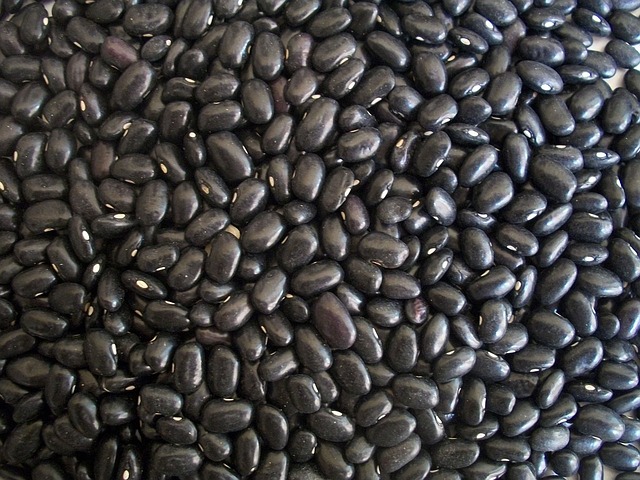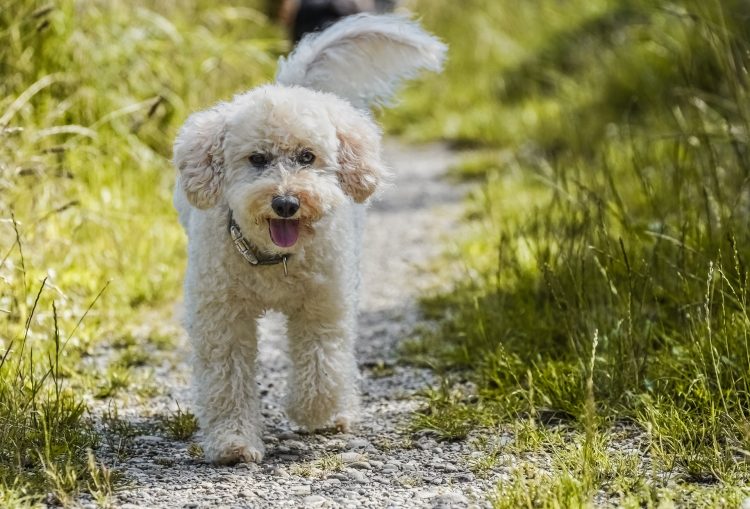
Black beans, known for being a good source of protein, fiber, and high antioxidant content, are a staple in human diets worldwide. As pet owners increasingly seek to provide their dogs with nutritious, whole-food diets, the question arises: Can dogs eat black beans? The simple answer is yes, dogs can eat black beans, but there are important considerations and precautions to ensure they are a healthy addition to your dog’s diet.
Are Black Beans Good for Dogs?
While black beans offer numerous health benefits, they must be prepared and served correctly to avoid any potential health issues:
- Cooking is Crucial: Raw black beans are harmful to dogs as they contain lectins that can cause nausea, vomiting, and diarrhea. Always cook black beans thoroughly before offering them to your dog to neutralize these compounds.
- Moderation is Key: Despite their benefits, black beans should be given in moderation. Their high fiber content can cause irritation in a dog’s stomach if consumed in large quantities. Start with a small amount to see how your dog reacts.
- Simple is Safe: Serve black beans plain, without any added salt, spices, or seasoning. These additions, like garlic or onion powder, can be harmful or even toxic to dogs, leading to unnecessary health issues.
- Avoid Canned Varieties with Additives: If opting for canned black beans, choose ones with no added salt or preservatives. It’s best to rinse them thoroughly to remove any excess sodium or additives.
Before introducing significant amounts of black beans or any new food into your dog’s diet, consulting with a veterinarian is advised. They can provide guidance for your dog’s specific health profile, dietary needs, and any potential risks associated with dietary changes.
How Many Black Beans Can Dogs Eat
When incorporating black beans into your dog’s diet, it’s important to follow size-specific guidelines to ensure their health and well-being. The following recommendations serve as a general guideline for how much black beans dogs of different sizes can likely eat. Remember, these amounts should not exceed 10% of their daily diet. It’s also important to introduce black beans gradually and observe your dog’s reaction, as individual tolerance can vary. Always consult your vet before offering your pup new foods like black beans.
- Extra Small (<10 lbs): For extra small dogs, start with less than a teaspoon of cooked, mashed black beans. Due to their small size, their digestive systems are more delicate, so it’s important to monitor their reaction.
- Small (10-25 lbs): Small dogs can have approximately 1 teaspoon of cooked, mashed black beans.
- Medium (25-60 lbs): Medium-sized dogs can enjoy about 2-3 teaspoons of cooked, mashed black beans..
- Large (60-100 lbs): Large dogs can have about 1-2 tablespoons of cooked, mashed black beans.
- Giant (100+ lbs): Giant breeds can consume up to about 2-3 tablespoons of cooked, mashed black beans. Given their size, they can handle a larger quantity, but it’s still important to proceed with caution and monitor their health.
Important Considerations:
- Always ensure that black beans are cooked thoroughly and served plain, without any added salt, spices, or seasonings that could be harmful to your dog.
- Watch for signs of stomach discomfort, such as gas, diarrhea, or vomiting, especially when introducing black beans or any new food into their diet.
- Consider your dog’s overall diet and nutritional needs. Dogs with specific health conditions or dietary restrictions may require a tailored feeding approach.
Nutritional Benefits of Black Beans
Black beans are a powerhouse of nutrients and can be beneficial for dogs and their immune system. Some of these include:
- Protein: They are a great source of protein, which is essential for muscle development and energy.
- Fiber: The fiber content in black beans can aid in digestion, help maintain regular bowel movements, and aid with maintaining a healthy weight by promoting a feeling of fullness.
- Vitamins and Minerals: Black beans are a good source of vitamins and minerals like Vitamin K, magnesium, and iron, which support various bodily functions from blood health to bone strength.
- Antioxidants: Antioxidants such as anthocyanins, can help combat free radicals, thus supporting overall health.
- Calories: Black beans have a low glycemic index, making them a good option for diabetic dogs or those needing weight management.

Preparation Tips for Black Beans
Preparing black beans for dogs requires some care to ensure they are safe and nutritious for your furry friend if they like the taste and texture. Here are essential tips to keep in mind when preparing black beans for your dog:
- Start Small: Introducing black beans into your dog’s diet should be done gradually. Begin with a small spoonful mixed into their regular food to assess their tolerance.
- Observation: Watch your dog for any signs of allergies or digestive upset after they eat black beans. Symptoms can include gas, bloating, vomiting, or diarrhea. If you observe any adverse effects, discontinue feeding them black beans and consult your veterinarian.
- Moderation: While black beans are nutritious, they should only make up a small portion of your dog’s diet and only be offered on occasion.
- Choose Dry Beans Over Canned: Opt for dry black beans rather than canned ones to avoid added salt and preservatives. If you must use canned black beans, select a low-sodium variety and rinse them well under cold water to remove any excess sodium and preservatives.
- Rinse and Soak: Rinse dry black beans under cold water to remove any dust or debris. This step is crucial for both dry and canned beans to ensure they are clean before cooking. Soak the dry beans in water for at least 8 hours or overnight to help reduce cooking time and decrease the potential for digestive upset.
- Cook Thoroughly and Properly: Fully cooked beans are crucial to avoid the risk of gastrointestinal upset. Cook them without any salt, spices, or seasoning as these additives can be harmful to them.
- Consult a Vet: Before making any significant changes to your dog’s diet, including introducing new foods like black beans, it’s wise to consult with a veterinarian. They can provide personalized advice based on your dog’s health status, dietary needs, and any specific concerns like allergies or sensitivities.
Allergies
While black beans are generally safe and healthy for dogs to eat in moderation, some dogs may develop allergies or sensitivities to them. Allergic reactions in dogs can manifest in various ways, ranging from mild to severe. Here’s a list of possible signs and symptoms that could indicate a black bean allergy in dogs:
- Gastrointestinal Symptoms: Vomiting, diarrhea, abdominal pain, and gas are all symptoms associated with allergies.
- Skin Reactions: symptoms like persistent itching or licking, or skin redness could signal an allergic reaction.
- Hives and Swelling: Raised, red, itchy bumps on the skin or facial swelling, particularly around the eyes and lips, or even the earflaps can be symptoms of an allergy.
- Respiratory Symptoms: While less common, some dogs may exhibit respiratory symptoms due to an allergic reaction, such as: sneezing, coughing, difficulty breathing.
- Behavioral Changes: Symptoms like lethargy, characterized by unusual tiredness or lack of energy, and loss of appetite.
Introducing new foods like black beans into your dog’s diet should always be done gradually and with close observation for any adverse reactions. Remember, while allergies to black beans in dogs are relatively rare, they can occur. Individual dogs can have unique sensitivities, so what is beneficial for one dog might not be suitable for another. If you suspect your dog has an allergy to black beans, it’s crucial to immediately remove black beans from their diet and consult a veterinarian for a proper diagnosis and treatment plan.
Thus, black beans can be a nutritious addition to your dog’s diet when prepared and served correctly. They can offer a range of health benefits, but, it’s important to introduce them slowly, in moderation, and after consulting with a veterinarian to ensure they fit well within your dog’s dietary needs.
FAQ
Can Dogs Eat Black Beans and Rice?
Dogs can generally eat rice, and so adding black beans to rice and offering a little bit to your furry friend can be an okay treat. It’s important to first consult with a veterinarian to ensure this combination is okay for your specific dog’s health.
Can Dogs Eat Black Beans Raw?
It is not advisable for dogs to eat black beans raw. This is because raw black beans can be toxic and cause an upset stomach or worse for your dog. Always thoroughly cook black beans before offering them to your pup.
Can Dogs Eat Black Beans From a Can?
It’s not a good idea to give dogs beans from a can because of salts and seasonings that are contained in them. These seasonings are often harmful to dogs and so it’s best to avoid giving dogs canned black beans.
What Other Types of Beans Can Dogs Eat?
Other beans like green beans, pinto beans, lima beans, and garbanzo beans, also known as chickpeas, are generally okay for dogs to eat in moderation and given the proper precautions and preparation are taken. Edamame beans, when removed from their shells and served plain, can be another bean for dogs to eat. However, refried beans, kidney beans, and chili beans are just some of the beans that dogs should avoid. These can cause health issues in dogs and are risky. Also research and consult with a vet before offering a new kind of bean to your dog.
Recipes
Incorporating black beans into your dog’s diet can be a fun way to spice up their meals while providing them with beneficial nutrients. Here are some simple, dog-friendly black bean recipes to get you started. Remember to introduce any new food into your dog’s diet gradually and in moderation to ensure they don’t have an adverse reaction. Always ensure that all ingredients are safe and suitable for your dog’s dietary needs.
Black Bean and Sweet Potato Mash
- Ingredients:
- 1/4 cup cooked, mashed black beans.
- 1/2 of a cooked, mashed and peeled sweet potato.
- Preparation:
- Cook the sweet potato until soft, then mash it.
- Mix the mashed sweet potato with the cooked, mashed black beans.
- Serve as a side dish to your dog’s meal or as a small snack.
Simple Cooked Black Beans
- Ingredients:
- 1 cup dried black beans.
- Some water.
- Preparation:
- Rinse the black beans thoroughly.
- Soak the beans in water for at least 8 hours or overnight to soften and reduce lectins.
- Drain and rinse the soaked beans.
- Add the beans to a pot and cover with fresh water.
- Bring to a boil, then reduce heat and simmer until the beans are soft (about 1-2 hours).
- Let cool completely before serving a small portion mixed into your dog’s regular food.
When preparing these recipes, remember:
- Always let any hot food cool down to room temperature before serving it to your dog.
- Adjust portions according to your dog’s size, caloric needs, and any specific dietary restrictions.
- Consult with your veterinarian before introducing new ingredients into your dog’s diet, especially if your dog has health issues or dietary sensitivities.


